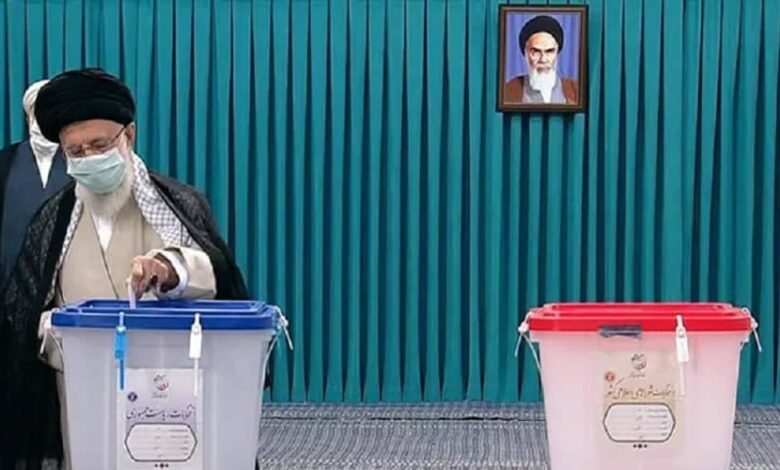Iran’s Regime Fears Election Boycott as a Sign of Growing Momentum for Regime Change

Written by
Mehdi Oghbai
Iranians-boycott-elections-while-regime-sources-imply-high-voter-turnout-in-Iran
Every two years, during Iran’s elections, people observe a familiar pattern where prohibitions become permissible. Women without veils actively support extremist clerics, certain political figures who had gained prominence in both foreign and state media are released from prison, and intense debates unfold on tightly controlled state TV. The entire narrative is carefully orchestrated, aiming to convince the audience that change is on the horizon for the country. However, after four decades of this repetitive masquerade, Iran’s society knows better than to fall for the ruse.
An example of pragmatic actions is the instrumental use of “hijab.” On January 11, the state-run newspaper Etemad wrote, “When someone wants to vote, you don’t care about their hijab, and they can vote. However, when that same person wants to go to a government office or visit a bank or airport to pursue their social rights, they explicitly state that we do not provide services to individuals with slight or no hijab! How can these contradictions be resolved for the awareness of the people today? When people confront such contradictions, what do they think, and what arguments take shape in their minds?”
The fierce intensity of advertising campaigns, threatening speeches, and cautionary articles in state media indicate that the clerical regime fears a nationwide boycott more than ever and regards it as an exposure of its illegitimacy. Irrespective of factional loyalties, former and current authorities, witnessing unmistakable signs of public apathy towards the parliamentary and Council of Experts elections, find themselves in a challenging predicament.
Each faction employs distinct strategies. The ruling faction resorts to tactics such as supplication, appeals, pragmatic methods, begging for participation in the election spectacle, and even likening it to religious obligations like prayers and fasting. Conversely, dissatisfied factions and those marginalized from power adopt oppositional postures and amplify criticisms, yet simultaneously try to sell participation in the ballot box as the sole viable solution. In doing so, they seek to convey a message to Ali Khamenei, the Supreme Leader of the regime, asserting that power-sharing is imperative, or else his downfall is inevitable.
#Khamenei Set to Suffer Significant Defeat in Upcoming Sham Elections in #Iranhttps://t.co/ejEJqcSqcW
— NCRI-FAC (@iran_policy) January 11, 2024
What is certain is that both factions have now realized the futility of propaganda and advertising for the election show. They understand that unprecedented public disgust has signaled the illegitimacy of the entire system, not the factions or individuals within it.
A notable piece of evidence, commonly labeled as a “debate,” unfolded on January 1st among three individuals representing the two factions. However, it wasn’t until twenty days later that the official IRNA News Agency published the details. Despite the event’s intended purpose of showcasing freedom of expression, it took an unfavorable turn for the regime, as the participants ended up articulating the very concerns that they sought to suppress.
In this debate, Shahab Tabatabaei, who identifies himself as a reformist, addresses the ruling faction, saying, “The people do not trust the entire system, and we are also part of this whole. There is no difference between me and you for the people who curse the system. Do you know why the people dislike us reformists more? They say that we make promises to them, and then you come to power and mess things up each time. You add a few more troubles, and the number of those who dislike the Islamic Republic increases.”
Tabatabaei went on to openly acknowledge the public’s discontent with both factions and the overall integrity of the system. Issuing a cautionary statement that in the event of the regime being overthrown, state officials from all political orientations would be hanged by the people, he stated, “I once remarked in a gathering of reformist friends: God forbid, if anything drastic occurs in this country, the distance between Seyyed Mohammad Khatami and Seyyed Ahmad Khatami would be merely six lamp posts!”
He warned, “We (from both factions) are playing the same game. Not against each other, but against those who seek to overthrow [the regime].”
Tabatabai eventually admitted, “All parties and movements operating under the Islamic Republic share a common point: whether we like it or not, there is a stark distinction between us and those seeking regime change.”
To understand that turning away from the regime’s staged elections directly leads to the strategy of regime change, the statements of official representatives of Khamenei are much more explicit.
Ahmad Alamolhoda, Khamenei’s representative in Mashhad, implicitly acknowledged this: “The enemy aims to instill despair and propagate negativity, encouraging you to stay at home, manage your businesses, and remain in your current locations, all while refraining from participating in the elections. This is why we emphasize that even if our military capabilities surpass the current conditions tenfold if the enemy is convinced that the people do not support this system, it will not hesitate to launch a military attack and invade the country, potentially as early as noon.”
However, Alamolhoda and his master, Khamenei, are fully aware that no foreign nation harbors intentions to invade Iran. Their genuine concern lies in a far more dangerous adversary, one they spend the most to counterfeit. An internally well-organized entity deeply ingrained in the country, with a historical background predating the regime itself.
Iran’s Regime Fears Election Boycott as a Sign of Growing Momentum for Regime Change

